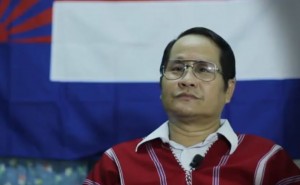
The Karen National Union’s, secretary 1, Padoh Saw Thaw Thi Bweh told Karen News that unless the situation in Burma guarantees refugees safety, their dignity and is conducted according to international humanitarian guidelines any return at the moment is not appropriate.
In an interview with Karen News, Padoh Saw Thaw Thi Bweh, Secratry of the Karen National Union, warned that the situation in Burma was not yet stable enough to see the safe return of refugees from Thailand.
“We, the KNU, firmly decided that if there is not yet political stability and a permanent ceasefire in Myanmar, it is not appropriate to repatriate the refugees,” Padoh Thaw Thi Bweh said, adding, “The Thai junta has assured us that they will not force the refugees to return home.”
Padoh Thaw Thi Bweh said that if efforts were made to return refugees in an unsafe manner in the future, the KNU would try and block such efforts. “If the Thai junta forces the refugees to return home or other organization would like to forcibly repatriate the refugees, we, the KNU, would like to prevent those plans. The refugees should not be forcibly repatriated unless they are repatriated with dignity as a group of human being with their fundamental rights to security, shelter, and food along with the process,” he said.
Padoh Thaw Thi Bweh said that a lack of information from the Thai government, the National Council for Peace and Order (NCPO), camp authorities and NGO’s tasked with assisting refugees was stoking fears of forced return.
“If the committees (the UNHCR) formally meet with the camps’ leaders and camps’ committees and inform them about the Thai authorities’ conducting refugees’ census or head counting process clearly with accurate reasons, the refugees will not be scared of the insecurity,” he said, adding that the Karen Refugee Committee would try and fill the information gap, “the refugees directly belong to the KRC and the KRC is responsible to inform them clearly so they will feel relieved.”
However, Padoh Thaw Thi Bweh voiced concern that reports in the regional media of meetings between Thai authorities and the commander-in-chief of Burma’s military – where the two parties agreed to work closely together on refugee repatriation – was a “severe” concern.
“The current Thai authority is the military regime, and they do or follow as the orders. Therefore, it is also a threat for the camps’ residents. At the same time their [Thai junta] meeting with the Myanmar General Min Aung Hlang also becomes a severe concern for us,” he said.
Refugees have expressed growing fears that repatriation will occur in the near future, pointing out recent cuts to rations, reductions in camp services and a recent crackdown on long-existing, though until now laxly enforced, camp regulations by authorities – including harsh restrictions on movement – are making life harder for them.
Community based organisations working with refugees have also expressed concern that refugees are being ‘squeezed out’ by the recent changes.
Confusion has also abounded in regional media on the repatriation issue. Last month a Bangkok Post report warned that the Thai military might return refugees “within one year,” and that the UNHCR was preparing to provide land to refugees going back. UNHCR denied these reports as “untrue.” While in an official statement, Thailand’s Ministry of Foreign Affairs stated that refugees would be sent back in line with “humanitarian principles” but failed to precisely outline a timeframe or under what specific humanitarian criteria refugees would be repatriated.
Padoh Thaw Thi Bweh concluded that if the current situation in ethnic areas remained as it was, refugees should not return. “[Even] If there is still no absence of civil war, and the political conflicts are not yet solved, or no political stability, it is absolutely not appropriate to repatriate the refugees.”
A 2012 report by the New York based Human Rights Watch, entitled ‘Ad hoc and inadequate,’ criticized Thailand’s treatment of refugees as being “fragmented” and thus leaving them vulnerable to abuse, exploitation and deportation.
“Burmese refugees in Thailand face a stark choice: they can stay in one of the refugee camps along the border with Burma and be relatively protected from arrest and summary removal to Burma but without freedom to move or work. Or, they can live and work outside the camps, but typically without recognized legal status of any kind, leaving them at risk of arrest and deportation. It is a choice refugees should not be compelled to make,” the report stated.
No comments:
Post a Comment